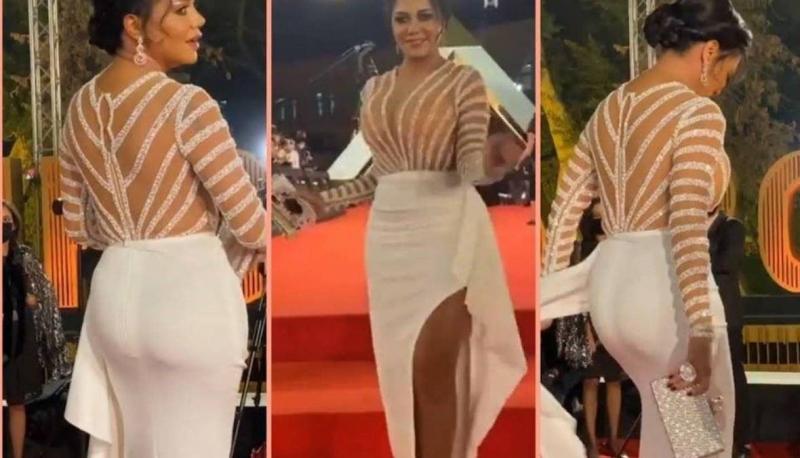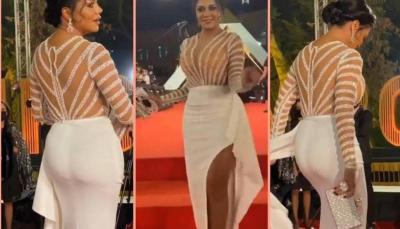Rania Youssef recently began filming her new project, in which she competes for the Ramadan 2022 season, directed by Abdel Aziz Hashad. She also showcased her previous works, including the series "The Mamluks" and "Street 9." Originally, her series "Mounawara Bi-Ahlaha" was supposed to air, but it has been postponed for unknown reasons. Rania Youssef is known for creating controversy with each appearance and her statements often trend online. Her fierce confrontations with her co-stars, and sometimes with the audience, regarding her presentations, including her fashion and remarks, continue to keep her in the spotlight. She strives to find unique projects that allow her to showcase her artistic capabilities clearly and to demonstrate that she can portray all kinds of roles.
In an interview with "Al Arabiya.net," she discussed these projects and their behind-the-scenes stories.
Currently, you are filming your new series "Aalam Tani" and competing in the Ramadan 2022 season. Tell us about it.
The series presents a different story, and my role will be a surprise to the audience, especially since I haven't tackled such character details before. The character I play is "Nagham," a pianist who experiences an accident that changes her life dramatically, leading her to a phase of spiritual transparency. She sheds the masks from those closest to her, whether it's her husband, friend, or brother. She resembles a small, vulnerable being battling relentless monsters. Will she succeed in defeating the monsters? The events will answer that question and define her ability to endure. The script, written by Islam Mahmoud Youssef, is crafted with great skill, and director Abdel Aziz Hashad has set a focused shooting schedule so we can wrap up at least by the beginning of Ramadan.
What about the series "Street 9," which airs on a digital platform?
I'm fortunate to have this opportunity as I will present a new and different side through this work. In this series, I will portray a real character that diverges from all my previous roles. I have prepared well for this character by studying and understanding its intricacies. I play "Ragya," a psychiatrist who faces issues with her husband due to her inability to conceive, amidst numerous developments resulting from her work and interactions with patients, uncovering various secrets about them in a social context that explores some issues faced by Egyptian families. From my perspective, it's a powerful and impactful work; the episodes rely on suspense and mystery through a murder that occurs in the storyline. The narrative discusses various love stories, corruption, and social tales surrounding the residents of a street in Maadi known as "Street 9," and it leans heavily on suspense and mystery, structured as a 45-episode series.
The series "The Mamluks" recently premiered, and the character you portray is different from your previous roles. Tell us about this experience.
I played a character central to all the events, as the audience saw. The character was complex and challenging, yet I encountered similar situations in my life frequently. Especially since the current economic and social conditions compel many to make concessions under the guise of necessity. She is a woman named "Hind Al-Abbasi," and throughout the events, we witness the journey of a poor girl rising to the top. In this journey, she relies on every opportunity presented to her and seizes all circumstances to achieve her desires, but she also faces significant losses—life is not solely about profits.
What motivated you to take on this work?
I was very excited about the script written by the author Hisham Hilal; the storyline captivated me greatly, and its quality encouraged me to accept the role, alongside working with director Hazem Foda. This is the first time Foda has ventured into dramatic directing, and it proved to be an excellent experience. Whenever there's a new spirit, there’s enthusiasm since everyone desires to prove themselves and aims for success, putting forth their utmost effort. The character was central to the plot, and the show's conflicts were well-balanced, arousing the viewers' curiosity and maintaining their interest without boredom.
The character you portray in "The Mamluks" is contradictory. Is there a real-life parallel to this character?
Certainly, there are many people we meet who resemble the character I discovered in "The Mamluks," especially in light of the economic and social conditions we are currently experiencing. I've mingled with and befriended many such individuals, and I've encountered deeper and more severe character traits as well.
The series consists of 60 episodes, followed by "Street 9" with 45 episodes amidst other series with ten episodes or sometimes fewer. Did you feel apprehensive about this concept?
On the contrary, as long as the series is engaging and its events are filled with excitement, each episode will have its unique thrill, and viewers will not feel bored watching the entire series. Therefore, I maintain the belief that if a series can present its content uniquely, whether in 45, 60, or even 90 episodes, it doesn’t matter—the crucial point is to deliver something that the audience won’t tire of.
You collaborated with Ahmed Sadany for the second time in the series "Mounawara Bi-Ahlaha." How was that experience?
I am pleased to collaborate with him again after "Afrah Al-Qobba" through the series "Mounawara Bi-Ahlaha," which carries the name "Qasasef Sour," alongside a number of stars. It's a drama comprising multiple stories, with each tale consisting of five to ten episodes. I truly enjoyed working with director Yosri Nasrallah and the entire cast.
You have worked recently with several directors and writers, some for the first time—how did you find that?
I am happy to work with them. I am not afraid to collaborate with new directors or writers in their first experiences. I always aspire to embrace new challenges as I love experimentation and risk-taking. I constantly see that a new director may possess fresh talents capable of rediscovering my abilities that I was unaware I had, through their perceptive vision.
You recently displayed the fourth season of "Miss Farah," which achieved extraordinary success. What are your thoughts on this experience?
The series always carries many surprises and is an imaginative narrative with its unique logic regarding human relationships. This season is the most rational, with the interplay among the mother, daughter, and granddaughter being incredibly intriguing, depicting a generational conflict. Each of the three characters behaves according to her age, maturity, and experience, and they each have different reactions. Naturally, each generation generally resists advice from the previous one. I was initially apprehensive about the bold premise from which the events unfold, but after a few episodes, we felt positive engagement from the audience, especially since the concept is imaginative and unrealistic.
You are returning to cinema soon after a two-year hiatus. What can you tell us about this experience?
Indeed, I am returning to cinema after a two-year break through a film titled "Malak," written and directed by Ayman El Refai. The film revolves around a female-oriented social issue that has begun to surface in Arab societies, and I will portray a character resembling many women.




